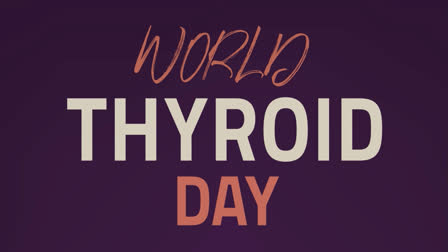New Delhi: As the World Thyroid Awareness Day is being observed on May 25, experts from India's health domain suggested that a balanced diet including diverse kinds of foods along with physical activity and proper awareness can protect people from thyroid.
The World Thyroid Day aims to raise global awareness about thyroid disease and its symptoms. Organisations working in the health sector organise awareness camps to educate people on thyroid disease and the importance of maintaining a healthy thyroid gland.
"Thyroid diseases are extremely common endocrine diseases, globally. However, with a few dietary and lifestyle practices, thyroid diseases can be avoided,"
said senior physician and assistant secretary of the Indian Medical Association (IMA) Dr Thakur Padmanabhan.
What is Thyroid:
Thyroid disorders can impact the overall well-being of people and adversely affect their health. The thyroid, the small gland situated at the base of the neck, is responsible for the secretion of two hormones including thyroxine (T4) and triiodothyronine (T3). These hormones affect every cell in the body. They support the rate at which the body uses fats and carbohydrates.
History of World Thyroid Day:
World Thyroid Day was first celebrated in September 2007 during the Annual General Meeting preceding the European Thyroid Association (ETA) Congress. The day, May 25 was not just a mere coincidence but held special importance as well. May 25 marks the anniversary of ETA’s foundation, which was formed in 1965. The main intention of observing World Thyroid Day was to raise awareness about thyroid disorders and their impact on individuals' health.
Symptoms:
Hyperthyroidism and hypothyroidism are the two common forms of thyroid disease. Hyperthyroidism refers to when the thyroid gland produces thyroid hormone higher than the normal level. People with hyperthyroidism have an increased metabolism, which leads to weight loss and an irregular heartbeat. Iodine supplementation can cause a spurt in autoimmune thyroid dysfunction and hypothyroidism, by making the thyroid gland more susceptible to damage by the body's own immune system.
Hypothyroidism refers to when the thyroid gland is not able to produce enough hormones, leading to an increase in weight, exhaustion, and feeling chills in the body. People who suffer from thyroid disorder have symptoms like fatigue, muscle trembling, increased weight gain or loss, increased sweating, etc.
Prevention:
Consumption of a balanced diet including food that is low in sugar and processed foods, maintaining a good selenium level, regular physical activity, and stress management are some of the factors that are helpful in controlling thyroid. Food with excessive sugar can lead to inflammation, which can worsen the symptoms of an underactive thyroid.
Thyroid prevalence in India:
- The prevalence of self-reported goitre or thyroid disorder in National Family Health Survey IV (2015-2016) was 2.2 per cent, while it was 2.9 per cent in NFHS-V (2019-2021)
- The NFHS IV (2015-2016) has reported that amongst individuals between the age - of 15-49 years - the self-reported prevalence of thyroid disorder was nearly 2 per cent in females and less than 1 per cent in males.
- The reported prevalence increased with age in women (15-19 years: 0.7 per cent; 20-34 years: 1.8 per cent; 35-49 years: 3.4 per cent)
